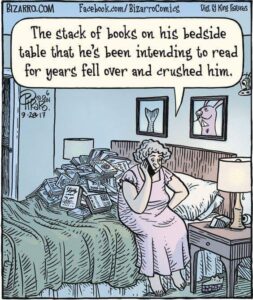Now that I’m actively out of employment, I have time to read books – I did have the time before, but precious “me time” and life’s priorities meant that making time for books was lower down the pecking order.
These days I also find myself re-reading some books that I read when I wore a younger man’s clothes. Usually this is because I intend to complete trilogies/series of books for which I’d only read the first novel.
Recent examples of the latter are, in 2022, reading the nine book series of The Expanse. Before embarking on this epic read, I’d just completed watching the final season of Amazon’s Prime Video series of The Expanse and can say, as is usually the case, that the books are better … ‘though the TV series is nonetheless very good, even despite the odd patch of wooden acting and stilted dialog.
Prior to that, in 2021, I read Frank Herbert’s Dune. Mind you, only the original trilogy and NOT the other 22 books which, in my opinion, flog an original concept to death.
In the same vein, in 2023, I intend to read Isaac Asimov’s Foundation series of books. This started off as a trilogy, but was subsequently expanded by the author and then, following his death, other high profile sci-fi authors doffed their cap by inserting their inclusions into the Foundation timeline.
I expect the Foundation books to be a very different experience from the aforementioned Expanse novels, simply because The Expanse was written by an author as a complete, one after the other, end-to-end epic, with each subsequent book starting either days/weeks/months/years/decades after the previous installment, but nonetheless tied together in terms of literary style, characters, storylines etc.
Similar to The Expanse, Apple TV have also serialised the Foundation books. Thankfully, mid-20th century misogynistic world-views have been updated with some previously male characters being replaced by women. In fact, I can’t recall women ever being mentioned in Asimov books – I think everybody was based on wholesome, white, middle class 1950s Americans!
Story Arc of Asimov’s Universe
Some digging about was required, but the story arc of Asimov’s universe can be presented in the order shown below. However, for the OCD completionists out there, it should be noted there are the following omissions…
- Between the first two entries (The End of Eternity and I, Robot), the young reader orientated series of six books featuring space ranger David Starr.
- Between the third and fourth Robot novels (The Robots of Dawn and Robots and Empire), the four book Robot Mystery series by Robert Tiedemann and Alexander Irvine.
- Between the fourth Robot novel and the first Empire novel (Robots and Empire and The Stars, Like Dust), the Caliban trilogy by Robert McBride Allen
1955


1 The main protagonist in this novel, Andrew Harlan, decided against Eternity Inc. and their constant change of the timeline. By so doing, he set in motion the necessary conditions that will eventually lead humanity to colonise space. In fact, in Foundation’s Edge, Dom tells the story (somewhat distorted by time) of the Eternals to Perolat and Trevize.
1950


2 The first robot short stories collection, which were all included in The Complete Robot, though it also contains binding text (Mind and Iron), no longer in The Complete Robot.
1982


3 A collection of thirty-one robot short stories published between 1940 and 1976.
1986


4 Robot short stories. Anthologized in a book with the same title.
1990


5 Robot short stories. Anthologized in a book with the same title.
6 Co-written with Robert Silverberg, this robot novel is based on Asimov’s short story The Bicentennial Man


1954


7 The first of the Robot novels (as opposed to what had, up until now, had been short stories)
1957


8 The second of the Robot novels.
1983


1985


1
0The fourth Robot novel.
1951


1
1 The first of the Empire novels.
1952


1
2 The second Empire novel.
1950


1
3 The third Empire novel, albeit the first novel to be published.
1988


1
4
The first Foundation novel.
1997


1
5
Part of the second Foundation trilogy, penned by Gregory Benford.
1993


1
6
The second Foundation novel, although it is, chronologically, the last written.
1998


1
7 Part of the second Foundation trilogy, written by Greg Bear.
1999


1
8 Part of the second Foundation trilogy, written by David Brin.
1951


1
9The third Foundation novel. It as actually a collection of four stories, originally published between 1942 and 1944, plus an introductory section written for the book in 1949. Published in 1955, and slightly abridged, as part of an Ace Double paperback with the title The 1000-Year Plan.
1952


2
0 The fourth Foundation novel, made up of two stories, originally published in 1945. Published in 1952 as an Ace paperback with the title The Man Who Upset the Universe.
1953


2
1 The fifth Foundation novel, made up of two stories, originally published in 1948 and 1949.
1982


2
2 The sixth Foundation novel.
1986


2
3 The seventh Foundation novel.




























